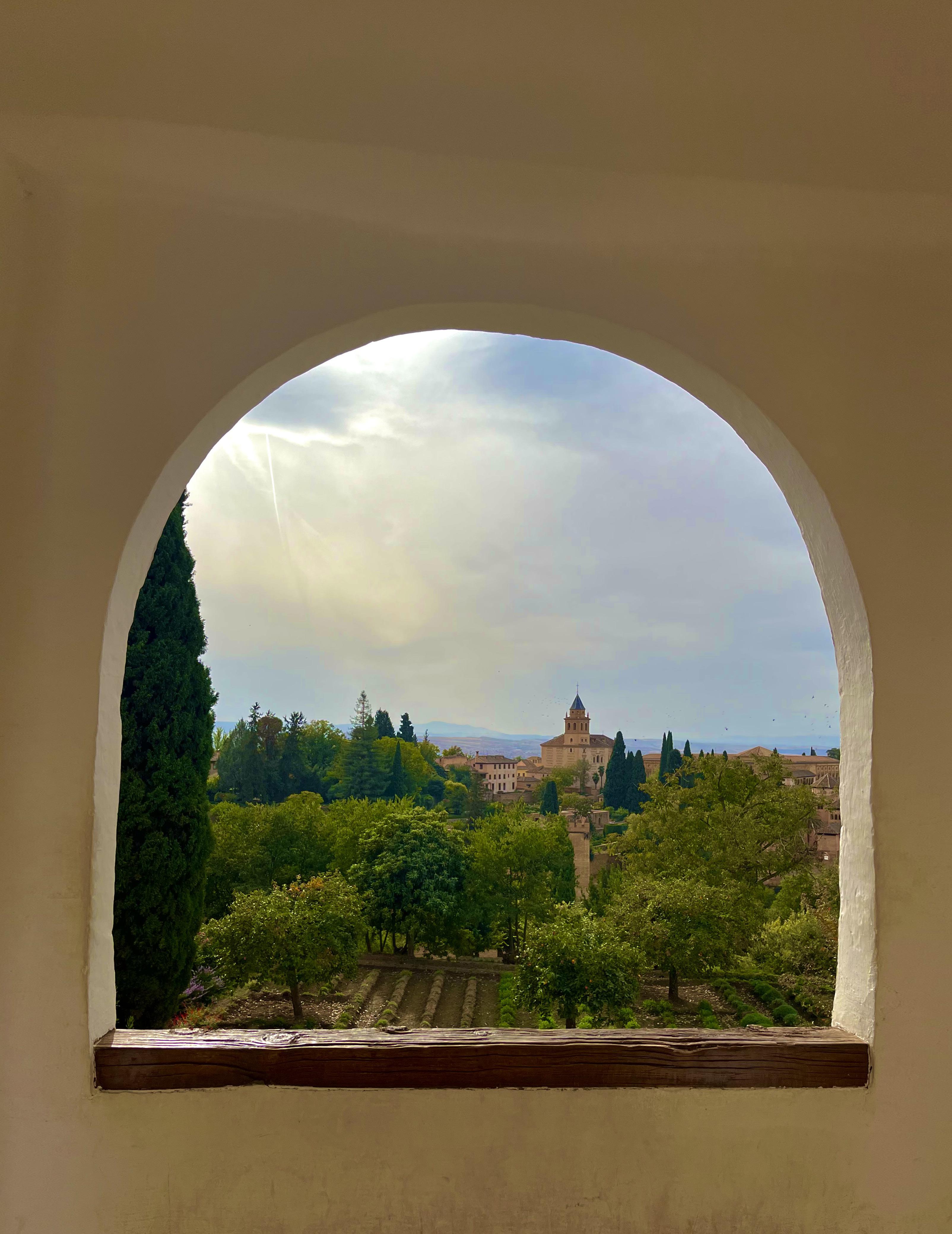
2022 – 23

PROGRAM ADMINISTRATION
Lisa Blaydes
Outgoing Faculty Director
Ali Yaycıoğlu
Incoming Faculty Director
Farah El-Sharif
Outgoing Associate Director
Halil Yenigun
Incoming Associate Director
Roula Khaled
Program Coordinator
Photo credits
The cover photo, “Window to the Alhambra” was taken by Jackie Foltz as part of the Stanford Global Studies Student Photo Contest.
Issue: 14 Published in 2024 TABLE OF CONTENTS 3 Director’s Letter 6 Faculty Profiles 10 Featured Affiliates 12 Student Updates 14 Minor Students 15 Events Highlights 17 Featured Events 18 News From Abbasi 19 Faculty Publications 22 Gifts & Support
AbbasiProgram
Above: Wall detail from Sultan Mosque, Manisa, Turkey. Photo Credit: Ali Yaycıoğlu
CONNECT WITH US islamicstudies.stanford.edu AbbasiProgram @AbbasiProgramStanford abbasiprogram@stanford.edu
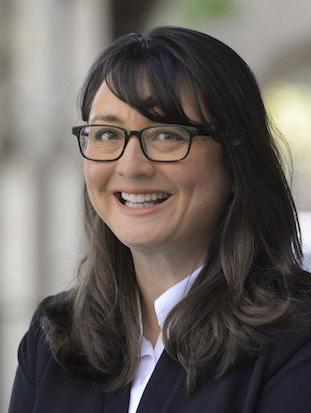
Lisa Blaydes
Outgoing Faculty Director, Abbasi Program in Islamic Studies
Professor of Political Science and Senior Fellow at the Freeman Spogli Institute for International Studies
Dear Friends,
As we bid farewell to 2023, the sensitivity and intensity of the current times defy expression. With the Middle East once again taking center stage in world politics, the need for scholarly interventions and reasoned debates has never been more pronounced. Although our focus in the previous year was on themes that unite and bind us, we now face the challenge of prevailing divisions and cleavages that have seemingly deepened. Our thematic interest during the Academic Year ‘22-’23, on the other hand, centered on “Oceanic Imaginaries,” representing concepts of expanse, exchange, ecology, and connectivity.
Returning to more in-person events post-pandemic, we expanded our program’s scope by introducing an annual lecture. Accordingly, a significant highlight of this year was the inaugural Abbasi Annual Lecture, featuring Carl Ernst and Mbaye Lo, who delved into the life and writings of Omar ibn Said, titled “What is the Autobiography of Omar ibn Said.” This lecture not only marked our program’s 20th year but also provided a unique lens on the underexplored, and often tragic, dimensions of oceanic exchanges, reevaluating the role of Islam and Arabic in post-Columbus America’s early history.
This year also marked our welcoming of two new faculty members, Rushain Abbasi, an assistant professor of Religious Studies, and Assoc. Prof. Patricia Blessing, who joined the Department of Art & Art History, strengthening our core faculty. In our continued commitment to enhancing student engagement, the second Abbasi Markaz fellow Aya Hilal organized stellar events, including a captivating presentation by Dr. Adnan Zulfiqar on prison abolition from an Islamic perspective, which garnered intense interest from the student community.
Among our noteworthy events, in collaboration with the Qatar Foundation and the Arabic Program at the Stanford Language Center, we hosted the third U.S. Universities Arabic Debating Championship between October 14 and 16, 2022. Moreover, we had the pleasure to host the AALIMS Conference 2023 on the Political Economy of the Muslim World, with two day-long workshops and panels focusing on the roles of culture and religion in the social, economic, and political trends of the Muslim-majority world, both in the past and the present. These events, along with our year-long lineup, covered diverse topics spanning continents, regions, and oceans worldwide.
In a change of leadership, I write this letter for the last time as the outgoing faculty director, passing the torch to Associate Professor Ali Yaycıoğlu from the History Department, specializing in Ottoman History. We also bid farewell this Summer to our associate director
OUTGOING DIRECTOR’S LETTER 3
INCOMING DIRECTOR’S LETTER
Farah el-Sharif, acknowledging her remarkable contributions to our community both with her knowledge and enthusiasm, and thanking Dr. Lalita DuPerron, who served as the interim associate director, for ensuring a smooth transition. Dr. Halil Yenigün, our new associate director, brings invaluable experience from various organizations he served and expertise in Muslim political thought.
Looking ahead, we are delighted to share the good news that our longstanding initiative, the Mediterranean Studies Forum, has transformed into the Middle Eastern Studies Forum with generous funding from the Office of the Dean of H&S. With this organizational makeover, we anticipate thriving Middle Eastern studies at Stanford, marked by active programming and rigorous scholarship.
Thank you for your continued support, and here’s to a promising year ahead.
Best regards,
Lisa Blaydes
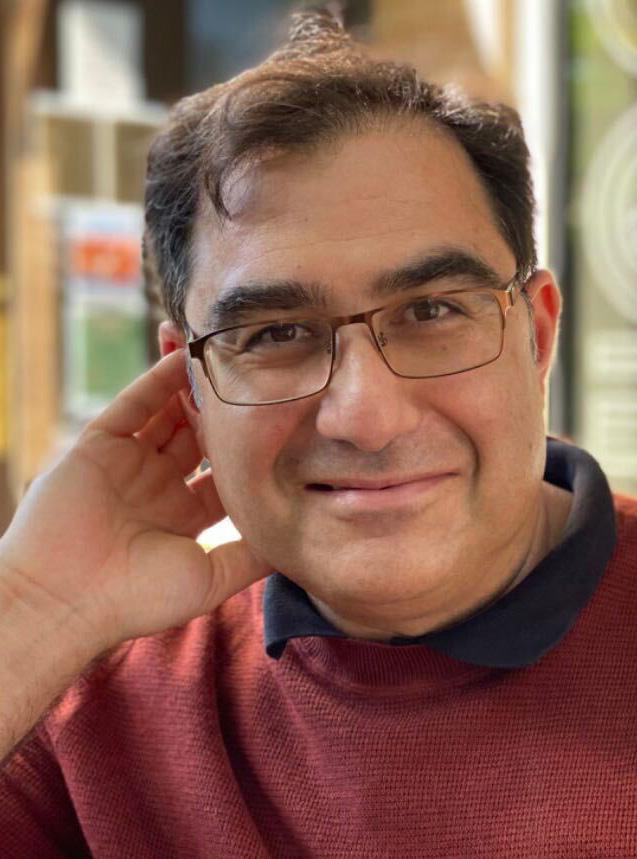
The Abbasi Program in Islamic Studies at Stanford was established twenty years ago in 2003 through the generous support of Sohaib and Sara Abbasi. Its primary aim is to serve as a pivotal forum for the examination of Islam and Muslim Societies within the Stanford community. In 2002, only a few faculty members were engaged in research pertaining to Islam and Muslim societies at Stanford. Over the past two decades, however, Stanford’s involvement in Islamic studies has experienced significant expansion. Presently, the Abbasi Program boasts over 20 tenured or tenured-line professors serving as primary faculty, along with 10 lecturers, numerous affiliate scholars, and a substantial number of graduate and undergraduate students. Marking its 20th year, the Abbasi Program stands out as one of the most rapidly advancing centers in the Humanities and Social Sciences at Stanford, characterized by its vibrant intellectual atmosphere, interdisciplinary ethos, and humanistic approach.
The Abbasi Program’s presence at Stanford holds particular significance in today’s challenging times, marked by global upheavals and wars affecting both majority and minority Muslim regions, pervasive political and economic
Ali Yaycıoğlu Incoming Faculty Director (2023-2026)
Associate Professor of History
4
uncertainties, and the widespread proliferation of polarizations and tensions rooted in cultural, religious, ethnic, and racial boundaries in the US and the world. The Abbasi Program in Islamic Studies is and will remain committed to serve as a hub for critical thinking, research, and public outreach, offering fresh perspectives that challenge established narratives, predetermined boundaries, and assumed positions.
During the academic years of 2022 and 2023, under the leadership of our former director Professor Lisa Blaydes and associate director Dr. Farah El-Sharif, the Abbasi Program sponsored several events that captured significant attention both on campus and beyond. In this new era, the Abbasi Program will further enhance collective participation and decision-making among its faculty members, aligning with the principles established at its inception. Stanford is increasingly positioning itself as a leading center for the study of the histories and societies of both majority and minority Muslim regions, as well as the intellectual and cultural traditions inspired by Islam.
The Abbasi Program, through its programming, will actively contribute to this dynamic environment and tailor its agenda accordingly. To this end, the Abbasi Program is sponsoring five ongoing workshops featuring talks and events, namely: (1) Intellectual Traditions in Islam, (2) Islam-inspired Arts, (3) Islam in the US, (4) The Arab Future and Past Series, and (5) The Ottoman and Turkey Encounters (the latter two are co-sponsored by the Stanford Middle Eastern Studies Forum). These workshops will provide comprehensive yet focused engagements, leveraging the expertise and strengths of our faculty members.
In conclusion, I am delighted to extend a warm welcome to our three new colleagues: Patricia D. Blessing, Associate Professor in Islamic Art and Architecture, who has joined the Art and Art History Department; Rushain Abbasi, Assistant Professor in Religious Studies and Islam, who has joined the Department of Religious Studies. Their scholarships will significantly enrich our program. Additionally, I am pleased to introduce Dr. Halil Ibrahim Yenigün, a leading expert in Muslim Political Thought, who has joined us as the new associate director of the Abbasi Program.
Lastly, but certainly not least, I wish to express my profound sorrow at the passing of Robert C. Gregg, Professor Emeritus in Religious Studies and the founding director of the Abbasi Program. Professor Gregg’s invaluable contributions have left an enduring legacy, and his absence will be deeply felt.
Ali Yaycıoğlu
5
FACULTY PROFILES
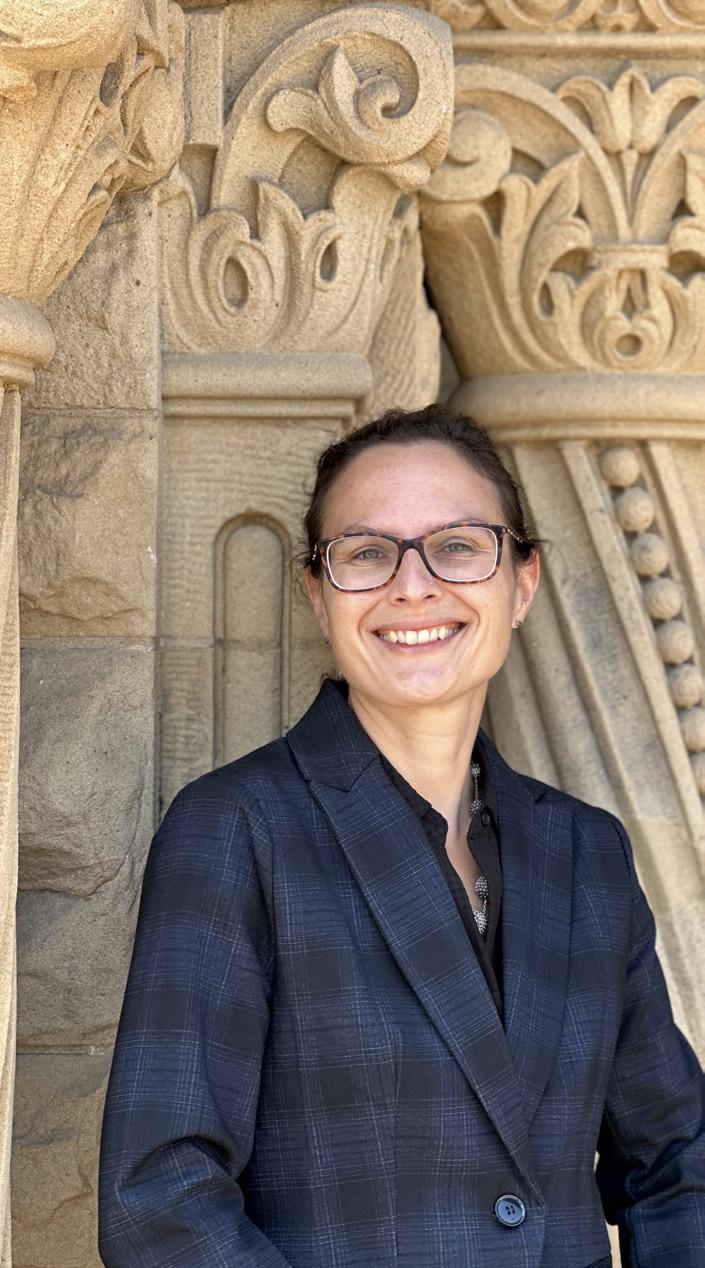
Patricia Blessing is an associate professor of art history. She has joined the Department of Art & Art History in Fall 2023. She specializes in the art and architecture of the Islamic world, with a focus on the eastern Mediterranean from the 12th to the 15th centuries. She is the author of two books, Rebuilding Anatolia after the Mongol Conquest: Islamic Architecture in the Lands of Rūm, 1240–1330 (Ashgate, 2014) and Architecture and Material Politics in the Fifteenth-century Ottoman Empire (Cambridge University Press, 2022). In her current book project, Spaces of Artifice: Interiors and the Environment in Islamic Architecture, Blessing analyzes interior spaces in relationship to nature, with an emphasis on water.
Could you please tell us about your research? What excites you in Islamic studies right now and why?
I am currently working on a book project on water and the environment in Islamic architecture. Focusing on examples in the eastern Mediterranean, built between the thirteenth and the sixteenth centuries, I analyze how interior spaces were designed in relationship to nature, with an emphasis on water. While gardens within the Islamic world have been studied in detail, less attention has been devoted to the ways in which nature is allowed to permeate buildings, and how it becomes part of interior spaces. For instance, buildings often contain water features such as fountains and basin, both indoors and in liminal courtyard spaces, supplied by aqueducts, cisterns. Such water features are integral parts of the buildings’ interiors and affect multisensory perception of these spaces. That latter aspect is how I got interested in this topic, but it now more and more develops towards eco-critical art history focusing on climate and the environment. At this moment, I find it exciting to be able to bridge between disciplines, and to contribute to connecting Islamic Studies to work on sustainability and climate change.
How did your interest in topics about Islam begin? Where does your research belong within the field of Islamic studies and how does it advance the field?
I began studying Arabic in my first year of college, initially because I wanted to study a new language and had always been drawn to the aesthetics of Arabic script even before I learned how to read it.
From language study, I got into courses on Islam and the history of the Islamic world. But most importantly perhaps, additional summer study of Arabic brought me to Cairo, a trip after which I was determined to study the arts and architecture of the medieval Islamic world.
Today, I work across Islamic studies and art history. I engage with theoretical debates in art history, both within my own subfield and beyond, recently for instance the sensory turn, and eco-critical art history. At the same time, understanding the monuments and objects I work on requires reading and analyzing written sources – histories, inscriptions, archival documents - in Arabic, Persian, and Ottoman Turkish, many of which remain untranslated, unedited, or unpublished. Accessing these sources and integrating them into a broader study is, to me, the place where my work connects to the “classical” work of Islamic studies that I started out with.
Upon translation, editing, and publication, what transformative impact do you foresee these materials having on the field of Islamic studies?
When sources are made available either through direct translation, or integration of their contents into studies on various areas – the history of art and architecture in my case – the reach of Islamic studies expands beyond those scholars and students who read the relevant languages, and make our field at large more accessible.
6
What are some of the favorite courses you have taught, or you will teach at Stanford?
Starting at a new institution is always exciting in terms of teaching as one gets to know the student body, students’ interests, and explores new venues for teaching and co-teaching. This year, I am particularly looking forward to teaching my graduate seminar Sensory Spaces, Tactile Objects: The Senses in Art and Architecture in the winter quarter. This seminar looks at research that combines the sensory turn in art history – one of the major methodological shifts of the last 15 years or so – with medieval and early modern art from a range of cultures but focusing on material from the Islamic world.
I am also teaching an introductory undergraduate lecture course in Islamic art history. In the spring, I will teach my seminar on cultural heritage and urban space in Cairo and Istanbul, a comparative course that I first taught in 2014, inspired by the events of the Arab Spring beginning in 2011, and Gezi Park in 2013. Ten years later, it will be a challenging task to look back, and see whether any of the hope in that moment remains.
Could you elaborate on the concept of the sensory turn and its relevance in contemporary contexts?
Right now, with the omnipresence of images on our phones, via the cameras we can use to capture everything in an instant, but also apps like Instagram and TikTok that largely rely on photographs and videos, we live in a world that is overwhelmingly

visual. Art history as a Western academic field since the 18th century was also for a long time focused on vision. With the sensory turn, vision’s primacy has been called into question. Looking at various senses and how artworks were made to engage them, but also examining sources including poetry for approaches to and definitions of the senses in various periods and cultures expands our understanding of how people engaged with the world around them. These insights help us question the hyper-visual nature of the contemporary moment, and, for instance, can offer lessons for accessible design as shown in the exhibition Senses: Design beyond Vision at the Cooper Hewitt Museum in 2018.
Where do you wish to see the future of Islamic Studies at Stanford in 10 years? And what message would you convey to students interested in a graduate program in this field?
I hope that Islamic Studies will be more visible and known to colleagues in the university who work in other fields. Collaborations beyond Islamic
Studies would be exciting, and I would love to see a graduate methods colloquium, or even an interdisciplinary graduate program, in Islamic Studies. If such a program were to be created, I think that it would hold amazing potential for students whose interests and methodologies do not squarely fit a single discipline.
What do you wish more people knew about your work?
Over the years, as much of my research is on architectural history, photography has become part of my research practice. I take and publish my own photographs whenever I can and learn much about the sites I photograph while doing so, reflecting on light, color, angles, what one can or cannot see without a zoom lens.
Thank you for the opportunity to learn more about your great work and for this great conversation.
Interviewed by:
Halil Yenigün
7
FACULTY PROFILES

Rushain Abbasi is an Assistant Professor of Religious Studies. He has joined Stanford Religious Studies Department in the Fall of 2023 as an Assistant Professor of Early Islam. He received his Ph.D. from the Department of Near Eastern Languages & Civilizations at Harvard University in 2021, where his dissertation was awarded the prestigious Alwaleed Bin Talal Prize for Best Dissertation in Islamic Studies. He formerly served as an Associate Research Scholar at the Abdullah S. Kamel Center for Islamic Law and Civilization at Yale Law School.
Could you please tell us about your research? What excites you in Islamic studies right now and why?
I’m currently working on a book and a few articles on the subject of early Islam. The book is about an event commonly referred to as “the Conquest of Mecca” but designated by Muslims as “the Opening of Mecca.” In a way, it could be said that I’m interested in exploring the difference between these two labels. The articles focus more specifically on the Quran and how it construes this thing we call “religion.” I should also add that I’m writing a series of essays on camels, turbans, and dates, which takes these objects as thresholds into the world of Islam. What excites me most in Islamic Studies right now is the shift I’m gradually discerning amongst nascent graduate students in which they appear to be questioning the
assumptions underlying the secular study of Islam by focusing their gaze on precisely that which eludes modern Western subjectivity (e.g., the unseen, the night, or flourishing in and through pain).
What is the difference between opening and conquest in short? What is so special about the unseen to understand Islam? Is there anything you could say about it that would attract more students to study Islam in their graduate studies?
Well, the defining feature of the event is the general amnesty granted to the Muslim community’s former oppressors and the incorporation of that group into the nascent polity. This of course led to an inevitable internal strife, for the question of sovereignty was never consummated, but I think this also created the conditions for the structural separation of law and state that is so characteristic of Islam. I read this as kind of “opening” in the temporal map of Western universal history. As for the “unseen,” the very fact that it is a central concept in the Quran and continues to be a major part of the Muslim experience makes it worthy of study; however, what is really intriguing about these and other similar notions is how they force the observer to reckon with things that they are themselves uncomfortable approaching as modern subjects. I think this may be even attractive for some students as they consider their options for graduate studies, since I would contend that the study of Islam exposes you to not only the richness of this foreign (or rather not so foreign) tradition but also to a struggle with one’s own assumptions (as products of a post-Christian society), which is of course the hallmark of the philosophical task.
How did your interest in topics about Islam begin? Where does your research belong within the field of Islamic studies and how does it advance the field?
In fact, I can trace it back to a specific moment in high school when an older brother-like figure of mine gave a presentation on the Fulani scholar-revolutionary Usman dan Fodio, who was the first caliph of the Sokoto Caliphate. I was totally blown away by this history and the fact that I had never heard a thing about it previously. Of course, this was only the spark; later, in college, I spent time in Amman, Jordan where I first began my serious study of Islam, both traditionally and academically. I would also say that my interest in politics and philosophy has always
8
guided my approach to Islam, which also speaks to my relationship to the field. Although I am a voracious reader of traditional-academic studies of Islam which primarily aim to historize its development, I see myself as offering an entirely different perspective (one more directly related to contemporary political and philosophical concerns) on Islam both as a discursive object and as a way of life. Pursuant to my training, however, this new outlook remains rooted in the age-old practice of philology: that beautiful craft whereby we learn to read more slowly and therefore more meaningfully.
Wasn’t philology the age-old Orientalist way of studying Islam? Is there anything it can offer this time around for a fresh look at Islam?
Yes, it was, and I still consider those works to be of considerable use (sometimes even more than contemporary offerings in Islamic Studies!). But, of course, many of their conclusions were misled by misguided assumptions. I think what they got right was the attention to reading texts slowly, word-by-word, in order to unravel an entire world. This is what I try to do when I study both Western and Islamic texts, and in my experience I’ve found that this kind of close reading practice, which turns dictionaries into guides, always has something fresh to offer to the reigning discourses of a time. This is what Nietzsche was able to do vis-à-vis the Western/Christian tradition, and we often forget that he was trained as a philologist. Let me also add that philology is really just the art of reading, which can include ethnography and other such non-textual modes of analysis. It’s really just about retrieving what is unsaid in an encounter and elaborating it to the furthest extent possible. Giorgio Agamben alludes to this at the beginning of his reflections on method (The Signature of All Things).
What are some of the favorite courses you have taught, or you will teach at Stanford?
I’m currently teaching an introductory course called “Exploring Islam” which I’m thoroughly enjoying so far. The students here at Stanford are truly inspiring. I also taught a course on Political Theology last year that was so intellectually stimulating that I hope to teach it again. In general, I like to read texts line by line with students, particularly those categorized as “Islamic” or “Western.”
Where do you wish to see the future of Islamic Studies at Stanford in 10 years?
I hope to see it in a place where it begins to make its own distinctive mark, one which is recognizable to scholars working in Islamic Studies. My sense is that the diverse and innovative nature of the core Islamic Studies faculty here will lend itself to a radically new way of approaching Islam within the academy, one which is not held back by the institutional inertia found in other universities with longer, more politically entangled histories. For example, I think it’s quite significant that the patron of this program is local to the Bay Area, and I hope that Stanford Islamic Studies will further connect itself to the world of Islam already present in this land.
Beyond the potential to produce more localized knowledge, what distinctiveness could Stanford offer to the larger field of Islamic studies in the long run?
I doubt there will be anything even resembling a “Stanford school of Islamic Studies,” but I think there’s a general preoccupation with religion and politics that seems to bring together much of the work our scholars do. That might give our program a particular flavor. More realistically, however, I think that all the scholars working here are generally at the cutting-edge of their respective subfields, and that willingness (and free ability) to think outside of the box is, I think, something which could make a considerable impact on the field.
What do you wish more people knew about your work?
I’m not sure if I wish more people knew about my work in the first place, but I suppose, given that we’re fundamentally constituted by a desire for recognition, I’d want people to know that my work is basically the result of a continuous attempt to read between the lines, which spirals me off into various directions, and then (hopefully) settles into a coherent set of reflections that may or may not get people to think more critically about themselves in relation to this thing called “Islam,” which is the great “Other” of our time (and thus perhaps the means of our coming into a deeper self-consciousness).
Thank you for the opportunity to learn more about your great work and for this great conversation.
Interviewed by:
Halil Yenigün
9
FEATURED AFFILIATES
Interview with the Abbasi Visiting Postdoctoral Scholar Gizem Sivri
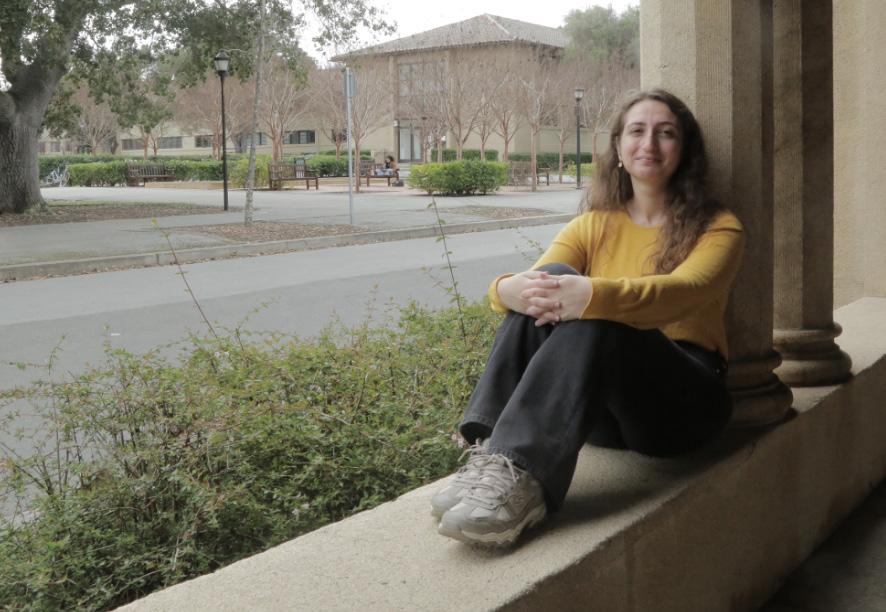
Can you tell us about your intellectual history? How did you end up at Stanford?
I joined the Abbasi Program as a Marie SklodowskaCurie global postdoctoral fellow in September 2023.
I received my Ph.D. from the Institute for Near and Middle Eastern Studies at Ludwig Maximilians University. My dissertation focused on the living conditions of women’s prisons and incarceration methods for female prisoners during the late Ottoman period (1840-1922). Throughout my doctoral studies from 2018 to 2022, I taught Ottoman social, political, and legal history. Following that, I was a visiting postdoctoral scholar at UC Berkeley’s History department during Spring 2022.
What sparked your interest in studying women in Ottoman prisons?
My fascination with women’s imprisonment first took root during my ATA Institute MA program (2015-2017) at Boğaziçi University, where I worked on a term paper on 19th-century Ottoman prison reform. Motivated by the scarcity of information on women’s incarceration, I sifted through Ottoman archives, unearthing understudied history of women prisoners. This initial interest culminated in my doctoral dissertation, arguably the first comprehensive examination of Ottoman women’s prisons.
What struck you most among your findings during your archival research?
I was surprised by the Ottoman tradition of using imams’ houses as women’s prisons. They kept this practice until the empire’s demise.
How do you think this topic contributes to our understanding of gender in general and gender histories in the Middle East in particular?
Recent years have witnessed a new interest in studying women’s criminality, punishment, and imprisonment within Middle Eastern historical contexts. This shift challenges traditional stereotypes, highlighting that women, often seen as mothers and wives, can commit serious crimes beyond sexual offenses or acts of self-defense. The evolving discourse emphasizes the importance of understanding how women are positioned within the penal system and how their incarceration differs from that of men.
How does their incarceration differ from that of men?
Women faced exclusion from standard carceral sanctions differently from their male counterparts and could also receive more lenient and tolerant punitive measures, particularly if they were mothers.
This particular gender history has global implications for redefining societal perceptions and promoting gender-sensitive policies within the criminal justice system. Also, the re-identification of criminal women opens an important chapter in Middle Eastern studies, prompting a more nuanced understanding of women’s roles, challenges, and experiences within the context of crime and punishment in history.
During your time at Stanford, what topics will your research focus on?
My postdoctoral project focuses on studying how Ottoman female perpetrators are identified and represented, as well as exploring narratives surrounding women’s involvement in criminal cases in late Ottoman and early Republican literature and press.
How would you like to share your research with the Stanford community, and do you have any lectures lined up for our audience?
I will give a talk at Abbasi in Spring ’24 on the late Ottoman women’s prisons. Moreover, my agenda includes engaging presentations and discussions with Stanford Gender History Workshop and Stanford Humanities Center. Beyond these academic commitments, I will give online and in-person presentations for various non-Stanford organizations.
Thank you for this very enjoyable conversation!
Interviewed by: Halil Yenigün
10
2023-24 Abbasi-Markaz Fellow
Salma Kamni is a senior studying Design and Human Behavior at the Stanford D. School. Salma grew up in a suburban community in Illinois dubbed “Little Palestine” – known for its large Arab and Muslim population. This has shaped her worldview and influences her interest in Muslim communities. Thus, she’s excited to work as the Abbasi-Markaz fellow this year. Salma hopes to use her degree to understand how different cultures and societies shape human behavior – and how those influences can be accounted for in product design. Salma’s hobbies include but are not limited to: taking a walk-in nature, drumming on her daff (frame drum), or reading!
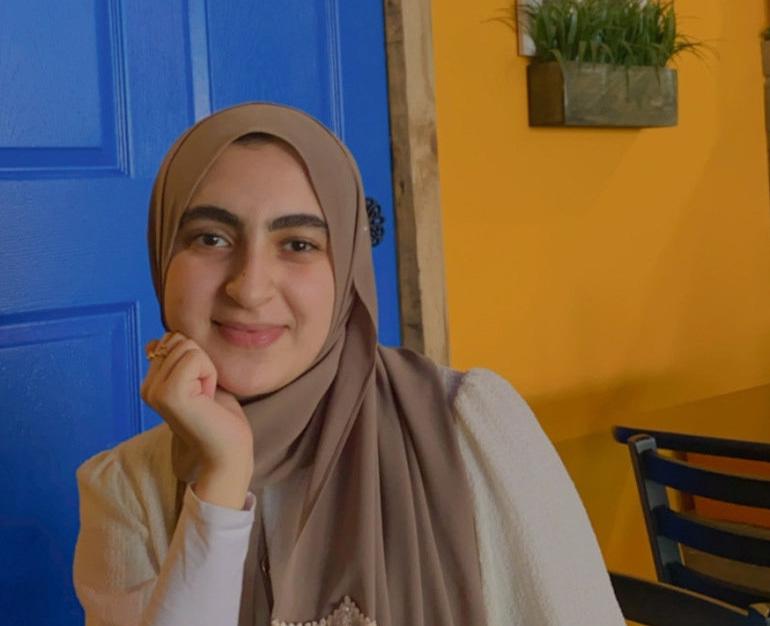
Student Coordinators

AJ Naddaff is pursuing a Ph.D. in the Comparative Literature program at Stanford’s School of Humanities and Sciences. He graduated from Davidson College in 2019 with a BA in political science and Arab Studies and received a master’s degree in Arabic literature and Near Eastern Studies from the American University in Beirut in 2022. His writings have been published in the LARB, the Washington Post, Foreign Policy, and the Associated Press among other outlets.
Bilal Nadeem is pursuing a Ph.D. in sociocultural anthropology at the Stanford School of Humanities and Sciences and an MD at the Yale School of Medicine. He obtained an MPhil in health, medicine, and society from the University of Cambridge and a BA in stem cell and regenerative biology from Harvard. Having conducted global health research in Brazil, China, and the UK, Bilal now hopes to study experiences of addiction and psychosis among Muslims in Pakistan.
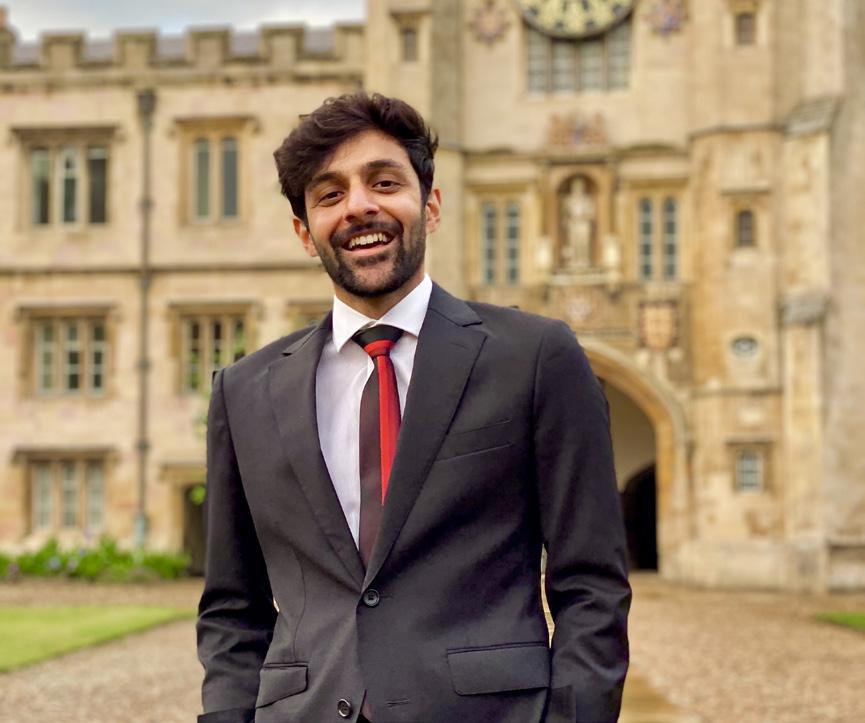
11
11
STUDENT UPDATES
The Abbasi Program supported 12 students pursuing their remote summer research, fieldwork, language study, or internship placements over the summer of 2023.
Internships
Language Study Research or Fieldwork
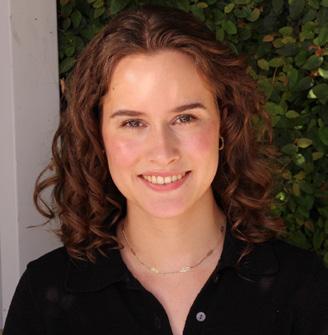
Abigail Schweizer
Undergraduate Art & Art History
Dumbarton Oaks Archives and Collection in Washington, D.C.
My goal was to explore Thomas Whittemore’s unpublished project of restoring Hagia Sophia in Istanbul (1934–1945) as part of my undergraduate Art History thesis on James Turrell’s light spaces. I spent three days poring over the Whittemore archives, sifting through dozens of folders, and deciphering his notes. The most comprehensive notes, titled “Observations on the Light in Hagia Sophia,” explained the diurnal cycle of light, how the most intense light occurs in the building between 8:30 a.m. and 11 a.m., depending on the season. Around 11:45 a.m. each day, sunlight directly illuminated the nave, coinciding with liturgical ceremonies. The priest would be at the nave’s altar, enacting religious rites, with the direct sunlight underscoring the sacred moment. Understanding the play of light in Hagia Sophia before modern interventions is nearly impossible without reading Whittemore’s notes.
Roya Ahmadi
Undergraduate, Human Biology
Moors & Saints in Morocco
Sammy Park
Undergraduate, Symbolic Systems
Corpus Musicae Ottomanicae (CMO), Münster, Germany
CMO is a research institute dedicated to the research and creation of critical editions of Ottoman music records from the 19th century. One of the most remarkable aspects of my internship was getting to work directly with historical source materials containing Ottoman classical music in Hampartsum notation. This experience was a rare opportunity for me to witness these original sources, which contained an absolute wealth of information not only concerning the performance practice of Ottoman classical music two centuries ago, but also crucial clues pertaining to the social context and transmission of these compositions between the Turkish, Armenian, and Jewish communities of Ottoman Istanbul.

My internship focused on the transnational artistic and architectural history of Morocco while living in Rabat and Marrakech. During my internship, I worked on two main projects. The first was called ‘Mapping Moorish Design,’ which was a research project on select Moorish architectural sites. I conducted extensive research on the history and modern engagement with the sites, compiled images, wrote descriptions for the art movements and craft traditions represented, and prepared the information for presentation in a virtual exhibit that maps expressions of Moorish design around the world. My second project was focused on writing short articles on modern examples of transnationalism in Moroccan arts and culture, with topics ranging from Moroccan Gnawa music to street art in Rabat. These projects allowed me to develop a research focus in an area that is the subject of my own art practice and the history of a population I am focusing on in my Human Biology major.
Sameeha Khan
Undergraduate, Comparative Studies in Race & Ethnicity Research in Ziyara Islamic Studies Program, Medina Baye, Senegal
During my time in Senegal, I engaged with the Islamic Studies program taught by Tijani scholars and creatives. This close, intensive study of “tasawwuf,” or Sufism, was instrumental in gaining the Islamic knowledge and inspiration needed for my experiential art installation, “A Sufi Soundscape.” In Dakar, I conducted informal interviews with rappers Mohammed Yahya and Clayton Hamilton, as well as artists Shasha Nader and Sukina Noor. These interactions guided my understanding of Senegalese Sufi sound and art practices and provided mentorship for my Sufi Soundscape installation. This support was pivotal in deepening my personal, academic, and spiritual exploration of Sufism and devotional art practices.
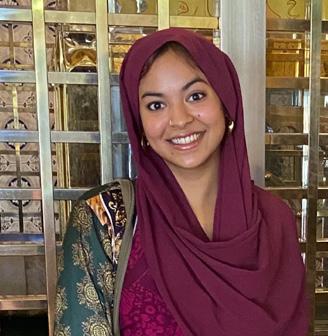
Samy Awwad
Undergraduate, Biology
International Humanitarian Relief, Gaziantep, Turkey
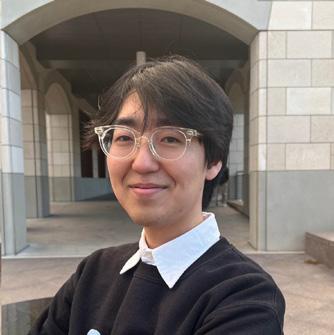
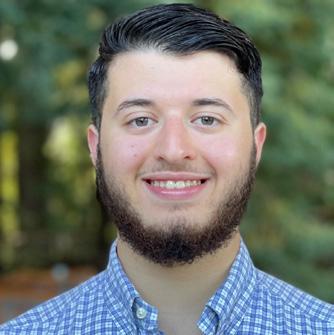
Not only was this my first time in Turkey, but it was also my first time working on the ground outside America following a devastating earthquake. I was fortunate enough to help orphans and other Syrian refugee earthquake victims psychosocially and as an “older brother” mentor, and I am motivated to dedicate a part of my life to orphans and refugees in the future.
Marina Johnson
Graduate, Theater and Performance Studies
Research in Palestine
I stayed primarily in Bethlehem and Ramallah, but also conducted interviews in Haifa, Tulkarem, and Jerusalem. Over the course of my eight weeks in Palestine, I attended the Bethlehem Site-Specific Theatre Festival and have a forthcoming review of it in the journal Arab Stages Additionally, I attended the Bethlehem Live Festival, a children’s theatre performance in Tulkarem, two plays in Haifa, three plays in Ramallah, and a site-specific performance in Jerusalem. I also experienced live music and was invited to watch rehearsals for upcoming productions in Jerusalem and Ramallah. One of my favorite events was the Bethlehem Site Specific Theatre Festival. During the final weekend of July, from the 26th to the 30th, I had the pleasure of watching the second edition of the festival produced by Al Harah Theater in Beit Jala in the Occupied Palestinian Territories. Thanks to the Abbasi Program, I was able to complete a critical stage of fieldwork in Palestine for my dissertation and make critical connections so that my next stage of fieldwork will be possible.
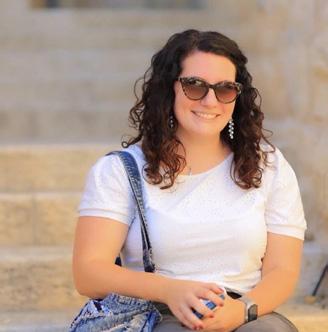
12
Layth Alkhani
Undergraduate, School of Engineering International Humanitarian Relief, Turkey

During my internship in Turkey, I provided psychotherapy support to refugee orphans and worked with teachers of a summer program to help advance their curriculum needs. I had the pleasure of working closely with extremely vulnerable populations, not only honing my clinical skills but also deepening my cultural competence and empathy. I learned firsthand about the unique challenges faced by refugees and the importance of providing culturally sensitive care. Overall, this experience strengthened my resolve to pursue a career in healthcare focused on serving marginalized communities and underscored the significance of compassion and cultural humility in providing effective care.
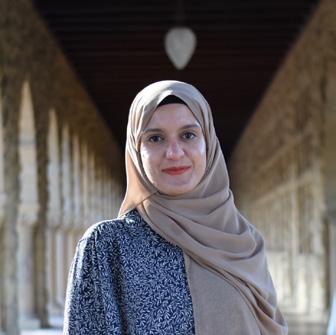
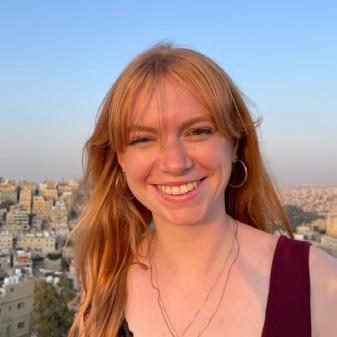
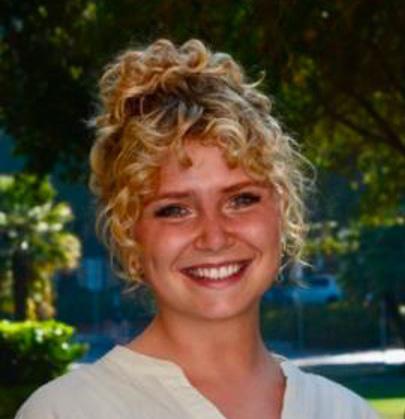
Alex Borthwick
Katharine Sorensen
Undergraduate, Classics, Economics, DLCL
Arabic Language Study at the American University of Beirut, Beirut Lebanon
I turned to the Abbasi Summer Grant opportunity to fulfill my desire for completing an immersive language course at the American University of Beirut. A typical week consisted of four hours of Arabic lessons in the morning at your proficiency level, followed by a variety of activities, ranging from guest lecturers and screenings of Arabic films to one-on-one meetings with your professor, cooking courses, calligraphy lessons, and Dabke dance classes. Additionally, every Wednesday, after our weekly morning assessment, we went on excursions either in Beirut or the nearby area. CAMES also offered three weekend Saturday trips to destinations such as Baalbek, Beit ed-Dine, the Jeita Grotto, Byblos, and Harissa-Daraoun. My experience with CAMES and in Lebanon this summer was one that I will treasure and appreciate throughout my time at Stanford and beyond. Not only did it help me substantially improve my Arabic skills, but it also allowed me to explore and come to love a country and culture in a way that would have been impossible without an immersive experience.

Rahemeen Ahmed
Masters Student In Civil and Environmental Engineering
National Disaster Management Authority in Pakistan
I truly appreciate this experience and the invaluable support from the Abbasi program and sponsors. I couldn’t have anticipated the importance, in my journey as an emergency disaster risk engineer, of understanding the challenges organizations like the National Disaster Management Authority face in regions with fewer resources for pre-disaster preparedness compared to the U.S. I aim to leverage my experiences, and the lessons learned from them, in my research and professional work in the future to develop solutions that genuinely empower communities globally, drawing upon local strengths and resources.
Undergraduate, International Comparative and Area Studies; Program in International Relations
Arabic Language Study at Qasid Institute in Amman, Jordan
I lived with a host family in the Amman neighborhood of Jubeiha. Apart from studying Arabic, I learned a great deal about Jordanian culture, dialect, and food from sharing my host mom’s family meals, playing games with the kids, and watching Arabic TV shows with my host sister, and generally being incorporated into family life. I also traveled to Jerusalem and took the bus to Bethlehem, visiting sites including the Western Wall, the exterior of Al-Aqsa and the Dome of the Rock, the Church of the Nativity, the Walled Off Hotel in Bethlehem, and much of the artwork on the Palestinian side of the separation wall. Having been interested in and having read about the IsraeliPalestinian conflict for several years, seeing these sites in person was a truly incredible experience.
Mae MacDonald
Graduate, Political Science
Ph.D. Research in Kenya
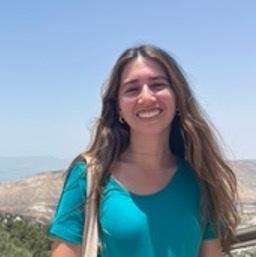
Nicole Benalcázar-Pavlik
Undergraduate, International Comparative and Area Studies
Arabic Language Study at Sijal Institute, Amman, Jordan
My dissertation project examines a new piece of refugee legislation that provides refugees with improved rights. I conducted a nationwide survey of Kenyan citizens on public attitudes towards refugees and refugee policies, in particular to understand the sources of discrimination towards Somali refugees compared to refugees from South Sudan. The key achievement of my research was implementing a 3,200-person telephone survey throughout Kenya. This data will allow me to conduct the first analysis of the effects of a refugee work rights policy on attitudes towards refugees over time. Being able to spend more time in Kenya has allowed me to deepen my knowledge of the country in ways that I had not anticipated, and which I’m sure will foster new research ideas and projects going forward.
The mornings were dedicated to fusha study, while my afternoon classes consisted of either a cultural activity or beginner classes in the Jordanian dialect ( Ammiya). During the second half of my time, I lived with a host family in Jabal Al-Weibdeh, which was also incredibly rewarding. I also felt blessed to travel during my time in Jordan. I visited churches in Madaba, the castle in Ajloun, and the ruins of Jerash. I snorkeled in the surprisingly blue Red Sea, viewed the Sea of Galilee from Um Qais, and stood in awe in front of the Great Temple of Petra. My favorite place, however, was Wadi Rum. Its towering rocks, breathtaking sunrise and sunset, and clear night sky are unlike anything I’ve ever seen. I believe it to be the most beautiful natural landscape in the world. Overall, my time abroad was a rich and unforgettable experience.
13
MINOR STUDENTS
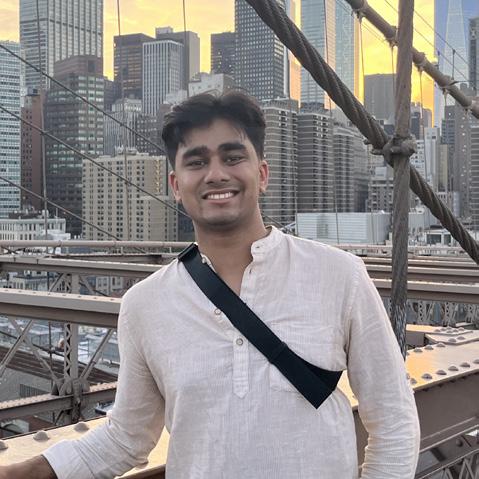
Yusuf
Zahurullah is a senior studying History with minors in Islamic Studies and Computer Science. Yusuf grew up in Rockford, Illinois, a city in Northern Illinois with a moderately sized and diverse Muslim community. He served as the inaugural Abbasi-Markaz Fellow in the 2021-2022 academic year, curating events with Abbasi and Markaz staff on the Islamic Golden Age, Black Muslim Art, and Islam in Eastern Europe. He additionally served as the inaugural Anti-Islamophobia Teaching Fellow with the Markaz, serving as a teaching assistant for classes on “Interrogating Islamophobia” and “Contemporary Islam & Muslims in America.” His senior honors thesis focuses on the American Muslim history of Detroit, specifically working with class and race dynamics. Yusuf hopes to continue his educational and professional journey in law school. In his free time, he enjoys trying new restaurants, playing video games with friends, and exercising.

Lara Hafez, a senior majoring in Political Science with minors in Islamic Studies and Human Rights, is from Southern California and proudly identifies as Palestinian from Al-Khalil. Her background deeply influences her aspiration to become a Human Rights lawyer, advocating for marginalized communities. Lara’s particular passion lies in supporting Muslim immigrant and refugee populations. As she prepares to embark on the journey of law school in the upcoming academic year, she eagerly anticipates the new challenges it will bring. Drawing from her education and experiences at Stanford, Lara aims to apply her insights to analyze how current human rights frameworks intersect with political dynamics in legal proceedings. She looks forward to gaining practical experience through various clinics, enriching her understanding of these complex issues. Beyond her academic pursuits, Lara finds joy in go-karting, watching beach sunsets, and taking leisurely strolls with her friends.
Minor in Global Studies with a specialization in Islamic Studies
Explore the complex array of histories, literatures, philosophies, intellectual traditions, and institutions related to Islam and Islamicate societies and communities by a Minor in Global Studies with a specialization in Islamic Studies. Complete 28 units, including:
• A three-unit gateway course, Global 101, which explores common themes in global affairs
• A minimum of 25 units of Islamic studies-related course
• Students may also work with the subplan advisor to develop a capstone project to count towards the unit fulfillment of the minor
For more information, please visit: islamicstudies.stanford.edu
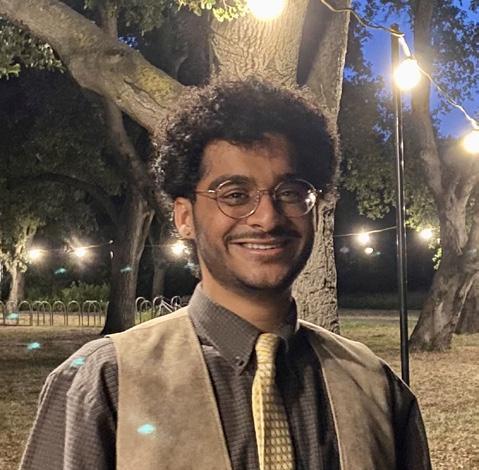
Hasan Tauha is a senior in Religious Studies. He is deciding
between UChicago and Harvard divinity schools for a master’s degree, after which he intends to complete a Ph.D. in near eastern studies. He is a student of Arabic, Urdu, Persian, and Turkish and has a broad ranging interest in the Islamic past which began with memorizing the Qur’an. He transferred to Stanford after growing disillusioned of the traditional curriculum at the Qalam Seminary in Texas and hopes to one day put critical academic scholarship into conversation with Muslim religious heritage. His undergraduate thesis is on the disappearance of heterodox tales about Muhammad from the early sirah literature. In his free time, he enjoys skateboarding and satirical cinema.
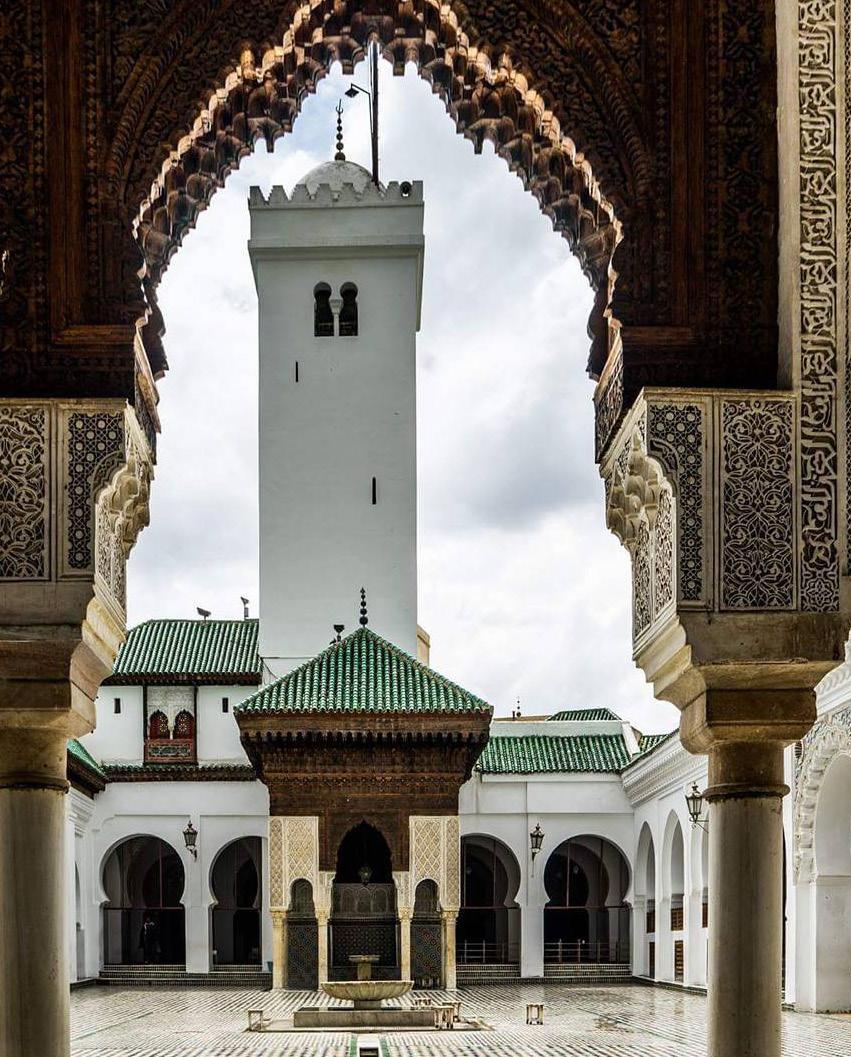
14

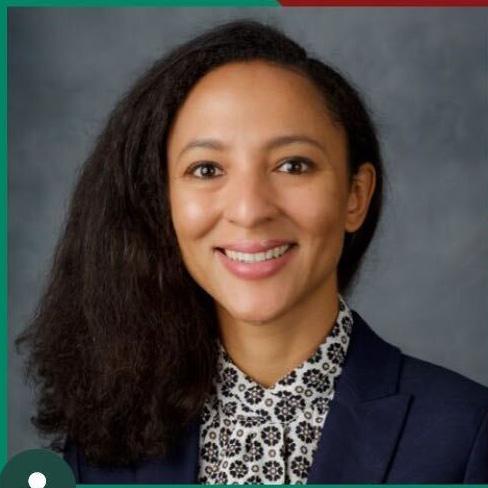
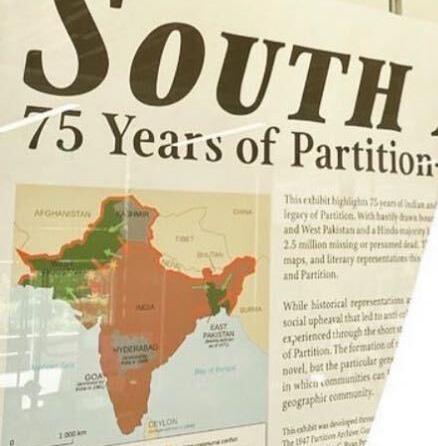
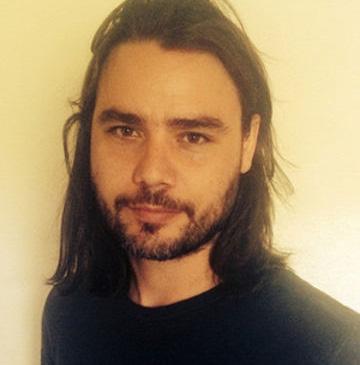
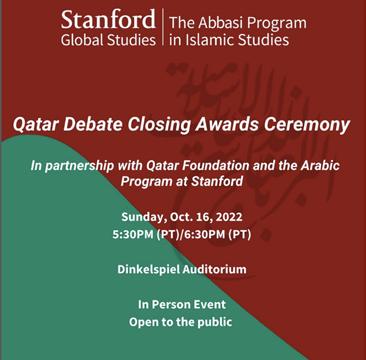
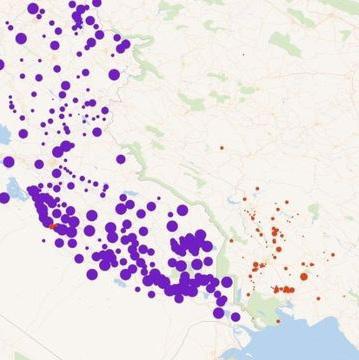
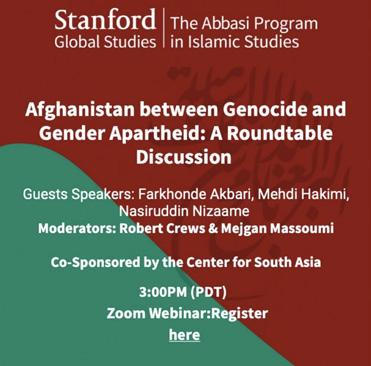

SGS Summer Film Festival: Dune Film and Book Discussion with Haris Durrani
August 17, 2022
Haris Durrani in conversation with Farah El-Sharif
Re-Imagining Ibadi Islam in the Western Indian Ocean
September 21, 2022
Kimberly Wortmann
Remembering Partition: 75 Years of Independence-Partition
October 6, 2022
A panel featuring local Partition witnesses
What is the Kaaba? Perspectives from the Early Islamic Period.
October 12, 2022
Sean Anthony
Qatar Debate Closing Awards Ceremony
October 16, 2022
The Third U.S Universities Arabic Debating Championship at Stanford University
Nora Barakat and David Wrisley: Beyond the National Archive: Digital Futures for Gulf Studies
October 18, 2022
Nora Barakat and David Wrisley
Afghanistan between Genocide and Gender Apartheid: A Roundtable Discussion
October 20, 2022
Farkhondeh Akbari, Mehdi Hakimi, Nasiruddin Nezaami, Robert Crews, Mejgan Massoumi
Pacted Democracy in the Middle East: Tunisia and Egypt in Comparative Perspective
October 31, 2022
Hicham Alaoui
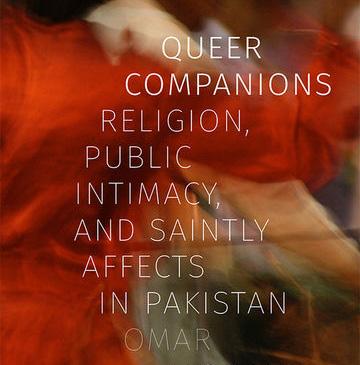
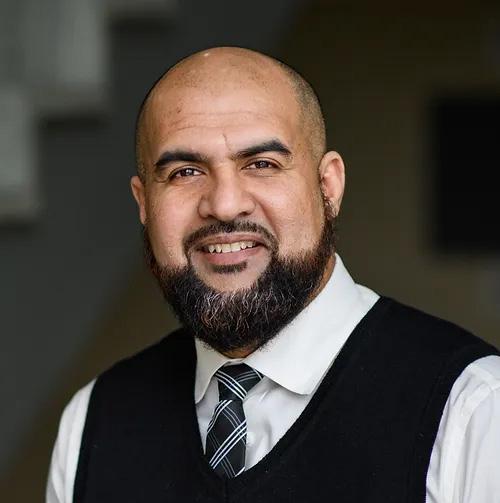
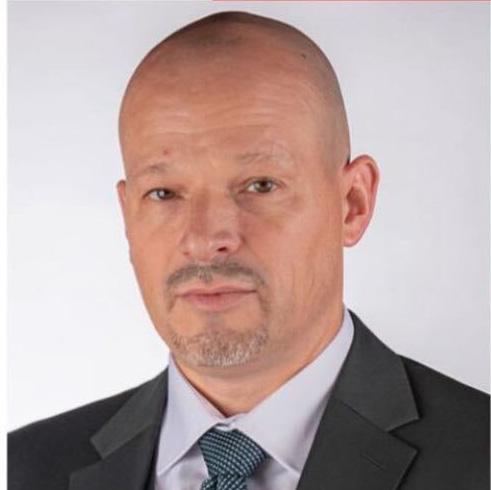

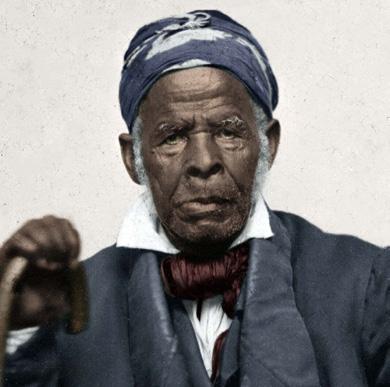
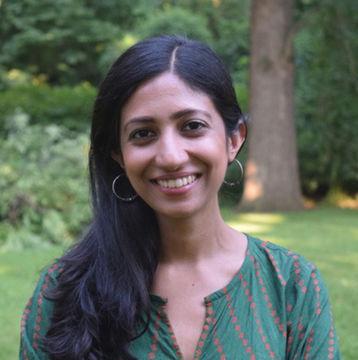
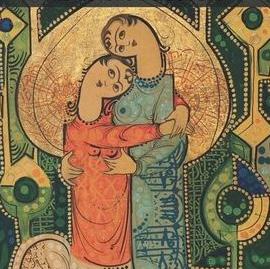
Queer Companions: Religion, Public Intimacy, and Saintly Affects in Pakistan
November 10, 2022
Omar Kasmani in conversation with Anjali Arondekar and Anna Bigelow
If Not Prison, Then What? Islamic Perspectives on Abolition
November 14, 2022
Adnan Zulfiqar
The Gnostic Qurʾān in West African Islam: Tafsīr and Sufism in Senegal
November 17, 2022
A Lecture by Professor Zachary Wright
Jamestown/Williamsburg Reading + Workshop
December 4, 2022
TAPS students Marina Johnson and Karishma Bhagani
Abbasi Annual Lecture: What is the “Autobiography” of Omar ibn Said?
January 18, 2023
Carl Ernst and Mbaye Lo
Community Policing Intervention in Gender Segregated Societies: Experimental Evidence from Pakistan
February 2, 2023
Sarah Khan
The Making of Persianate Modernity: Language and Literary History between Iran and India with Alexander Jabbari
February 10, 2023
Alexander Jabbari
EVENT HIGHLIGHTS
15
EVENT HIGHLIGHTS
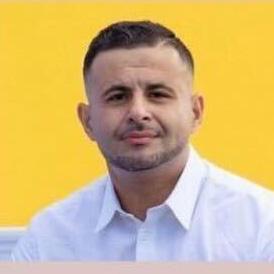
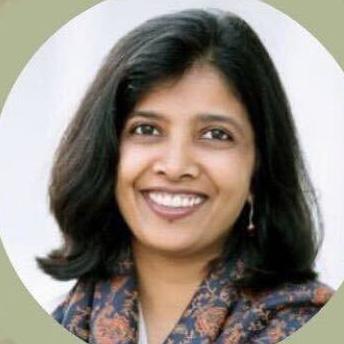

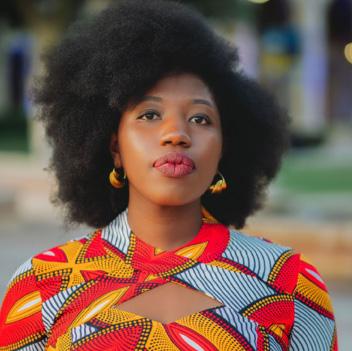
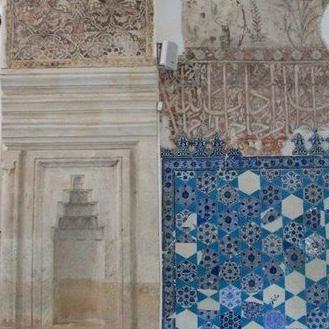
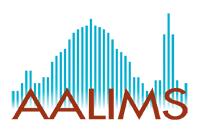

A Conversation on Global Islamophobia with Khaled Beydoun
February 27, 2023
Rania Awad in conversation with Khaled Beydoun
The Abbasi-Markaz Fellowship Presents: “Where are the Muslim Women Scholars?”
March 2, 2023
Asma Sayeed
STAND Screening and Discussion with Mahmoud Abdul-Rauf
March 4, 2023
Mahmoud Abdul-Rauf in conversation with David Palumbo-Liu
After the Jihad, Before the Federation: Making a SenegaleseSudanese Household in Colonial Mopti
March 15, 2023
Madina Thiam
Architecture and Material Politics in the Fifteenth-century Ottoman Empire
March 16, 2023
Patricia Blessing
AALIMS Conference 2023
April 7-8, 2023
AALIMS-Stanford Conference on the Political Economy of the Muslim World organized by Lisa Blaydes, Saumitra Jha and Timur Kuran
The Wine of Babylon: Rethinking the Sacred in Late 17th-century Damascus
April 10, 2023
Samer Akkach

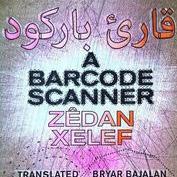

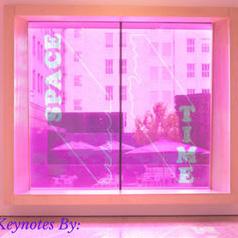
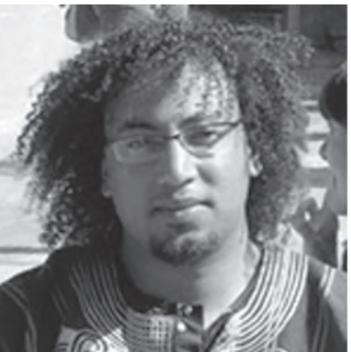

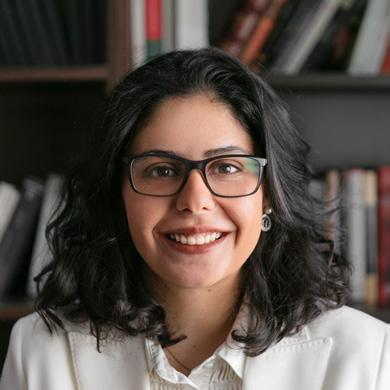
The Predicament of Islamic Decoloniality in Turkey: Sufi Political Thought and the “Great East” Project of Necip Fazıl Kısakürek
April 18, 2023
Alev ÇINAR
Zêdan Xelef, “Poet from Mesopotamia”
April 29, 2023
Zêdan Xelef
Nakba in the Age of Catastrophe: Lessons from Palestine
April 25, 2023
Sherene Seikaly
7th Annual Berkeley-Stanford Graduate Symposium: In-Between: Art & Cultural Practices From Here
April 28, 2023
Organized by Alexandra Adams, Josh Feng, Andrea Jung-An Liu, Maria Shevelkina, and Sofia Silva
Ibn Arabi Society Bay Area Meeting: A Workshop with Oludamini Ogunnaike
May 6, 2023
Oludamini Ogunnaike
SGS Summer Film Festival: Daughters of Abdul Rahman
June 28, 2023
Film Screening followed by a discussion with Director Zaid Abu Hamdan
Head Above Water U.S. Book Launch
July 18, 2023
A Book Talk with Author Shahd Alshammari moderated by Dr. Ramzi Salti
16
16
Abbasi Annual Lecture: What is the “Autobiography” of Omar ibn Said?
January 18, 2023
Carl Ernst and Mbaye Lo
In 2023, the Abbasi Program in Islamic Studies celebrated its 20th anniversary with the launch of the inaugural Abbasi Annual Lecture. During the event, Carl Ernst, professor at the University of North Carolina at Chapel Hill, and Mbaye Lo, associate professor at Duke University, discussed the “Autobiography” of Omar ibn Said (1770-1863), a Muslim scholar who was captured in West Africa and sold into slavery in America. This event also constituted the premier book launch for Ernst and Lo’s original research on ibn Said’s life and writings. Ibn Said left behind a unique record of his experiences through this 1831 autobiography. Notably, the lecture expounded on the theological and mystical aspects of his writings, encapsulated by his statement, “I cannot write my life.” Mbaye Lo and Carl W. Ernst wove fresh and accurate translations of Omar’s eighteen surviving writings, for the first time identifying his quotations from Islamic theological texts, correcting many distortions, and providing the fullest possible account of his life and significance. Placing Omar at the center of a broader network of the era’s literary and
If Not Prison, Then What? Islamic Perspectives on Abolition
November 14, 2022
Adnan Zulfiqar
During the Abbasi-Markaz event titled “If Not Prison, Then What? Islamic Perspectives on Abolition,” the Markaz community center hosted Dr. Adnan Zulfiqar, a Rutgers Law Professor and a Stanford Humanities Center Fellow. Dr. Zulfiqar led an introductory conversation about Islamic legal discourse on prison abolition, highlighting perspectives on justice beyond incarceration in Islamic societies. Dr. Zulfiqar combined an evidencebased historical scope and a
FEATURED EVENTS
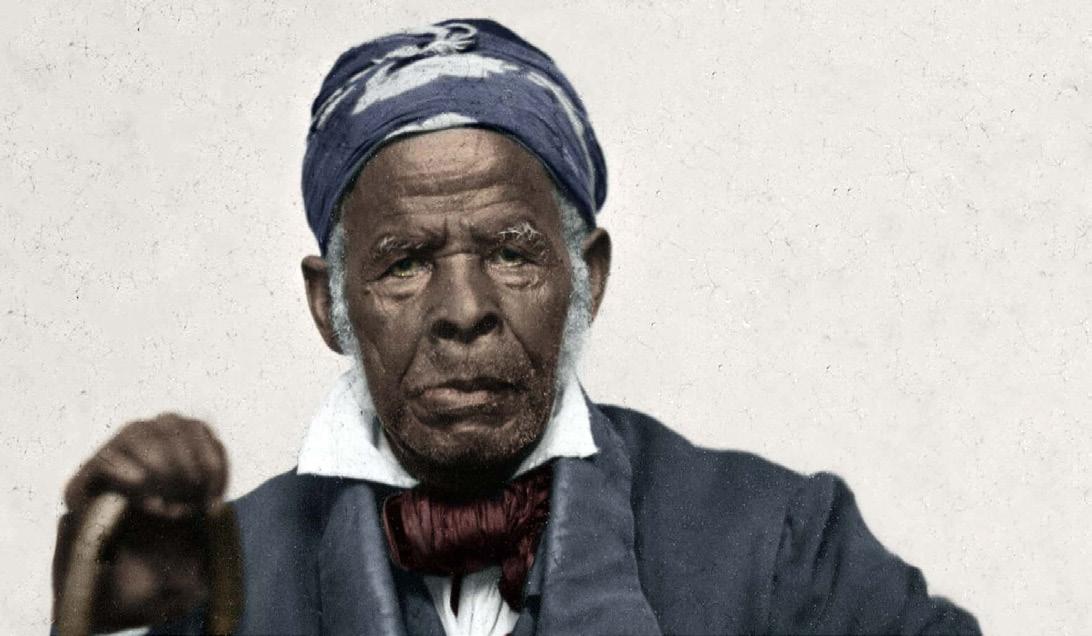
religious thought, they sought to restore Omar’s voice, his sophisticated engagement with Islamic and Christian theologies, his Arabic skills, and his extraordinary efforts to express himself and exert agency despite his enslavement.
Apart from celebrating the program’s two-decadelong history, this lecture also invited a reevaluation of the role of Islam and Arabic at the dawn of America’s history by bringing to light the enduring legacy of Omar ibn Said. The event was co-sponsored by the Center for African Studies, the Department of Religious Studies, Stanford Global Studies Division and the African & African American Studies, with over 80 people in attendance.

modern legal one to address a debate that breached both legal and social justice spheres. A key highlight of Dr. Zulfiqar’s argument was his examination of classical Islamic scholars’ perspectives on prisons in Islamic societies. He
emphasized that prisons, in their contemporary form, were never a long-standing historical fixture for Muslims, drawing attention to the role of colonialism in importing Western conceptualizations of incarceration.
The primary aim of the event was to present accessible information to a wider campus audience unfamiliar with abolition and/or Islamic studies. The event took place on November 14, 2022, and was well-attended, with about 25 people present. There was approximately 40 minutes of conversation between Dr. Zulfiqar and the Abbasi-Markaz fellow before the floor was opened up to audience questions. (Reported by Aya Hilal.)
17
NEWS FROM ABBASI
In Memoriam: Robert Gregg
It was with great sadness that the Abbasi Program in Islamic Studies announced last April the passing of Robert C. Gregg, the Teresa Hihn Moore Professor of Religious Studies Emeritus, and our Program’s Founding Director. A prolific scholar and award-winning teacher, Professor Gregg was also a devoted mentor, pastor, colleague, and friend. He was dedicated to bolstering the study of Islam and Islamicate societies and communities, and played an integral part in supporting the growth of the field on the Stanford campus. Throughout the years, he provided unwavering support to our staff, students, and faculty, and his absence will be deeply felt. Once again, we extend our heartfelt condolences to the Gregg family, and particularly to his beloved wife, MaryLayne.
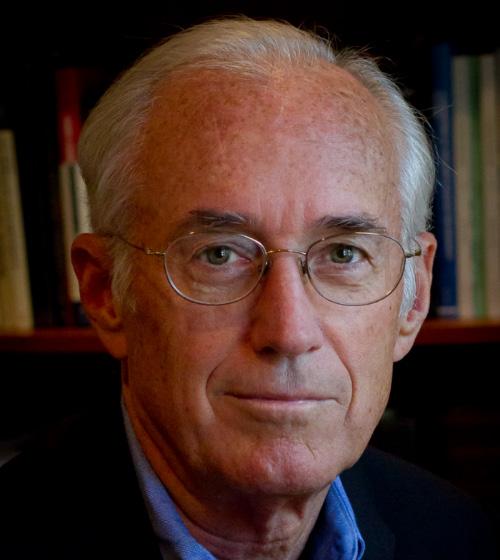
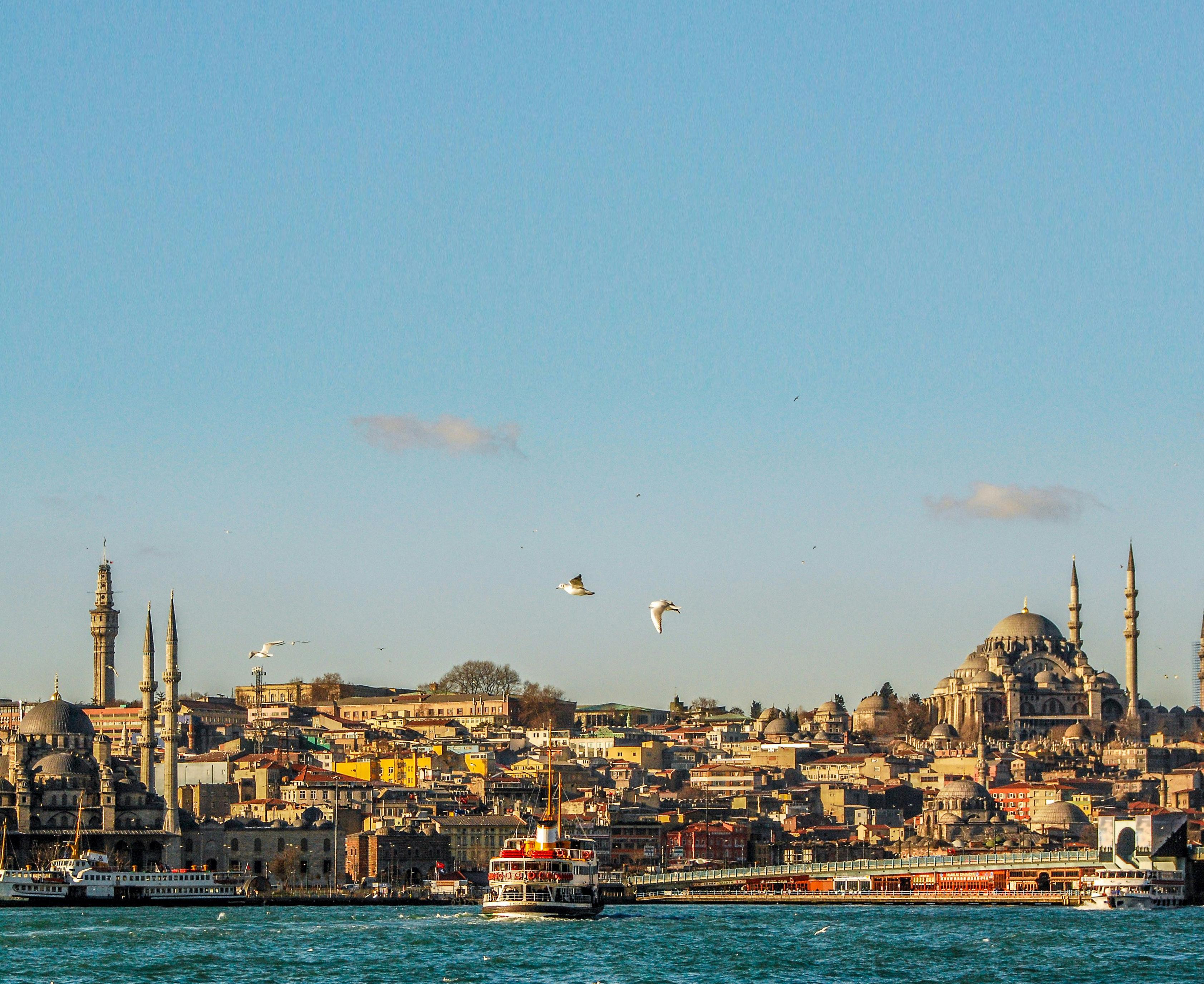
Exciting Announcement: Launch of Middle Eastern Studies Forum (MESF) under the Abbasi Program
In response to the expanding interest in Middle Eastern studies within the Stanford community, we are excited to share the news of the Middle Eastern Studies Forum (MESF)’s inauguration under our Abbasi Program. With an ever-growing body of scholarship and dedicated faculty at Stanford in this field, the launching of MESF is intended to fill a crucial gap, providing a focal point for research, scholarly exchange, and collaboration on topics related to the Middle East.
Led by the initiatives of our faculty director, Professor Yaycıoğlu, and with the pivotal support of Dean Debra Satz and Senior Associate Dean Gabriella Safran, the Office of the Dean has generously provided seed funding to initiate MESF. This forum will supersede and broaden the scope of the longstanding but relatively inactive Mediterranean Studies Forum, offering a dedicated platform for the study of the Middle East.
MESF will engage in diverse event programming based on program clusters around key themes such as
“Arab Futures and Pasts” and “Ottoman and Turkey Encounters at Stanford (OTES).” This initiative marks the culmination of decades of scholarly growth of this field at Stanford and will hopefully move it forward with new vitality.
We envision MESF as a vibrant center of academic distinction, positioning Stanford at the forefront of the field among leading institutions on the West Coast. We look forward to the support of our community as we embark on this new chapter of Middle Eastern studies at Stanford.
18
FACULTY PUBLICATIONS
The following publications by the Abbasi affiliate faculty and graduate students came out during the 20222023 academic year:
Altaras, Nesi. “The Jews of Van-Urmia: Remembering Borderland Migrations (1914-1918).” Jewish Social Studies 28, no. 1 (Winter 2023): 79-115.
Barakat, Nora, Ali Yaycıoğlu, and Yunus Uğur, eds. “Digital Ottoman Studies.” Journal of the Ottoman and Turkish Studies Association 9, no. 2 (2022).
Barakat, Nora, and Ali Yaycıoğlu. “Critical Approaches to Ottoman Studies: Promises and Challenges.” Editors’ introduction to special dossier “Digital Ottoman Studies.” Journal of the Ottoman and Turkish Studies Association 9, no. 2 (2022): 17-31.
Barakat, Nora, Camille Cole, David Joseph Wrisley, and Nada Ammagui. “Mapping Tribes: Ottoman Spatial Thinking in Iraq and Arabia, c. 1910.” Journal of the Ottoman and Turkish Studies Association 9, no. 2 (2022): 205-242.
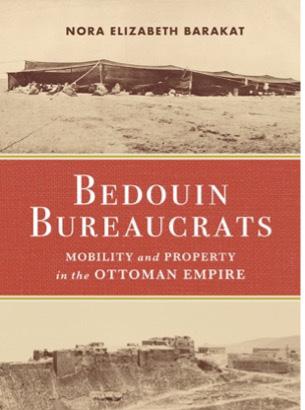
Barakat, Nora. Bedouin Bureaucrats: Mobility and Property in the Ottoman Empire. Stanford: Stanford University Press, 2023.
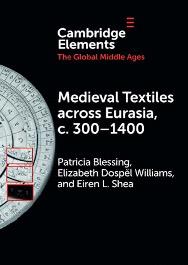
Blessing, Patricia, Elizabeth Dospel Williams, and Eiren L. Shea. Medieval Textiles across Eurasia , c. 300-1400 CE. Cambridge Elements series on the Global Middle Ages, edited by Geraldine Heng and Susan Noakes. Cambridge: Cambridge University Press, 2023.
Blessing, Patricia and Richard P. McClary. “Reimagining Royal Space: The Qilij Arslan II Kiosk in Konya and its Lost Interior.” Journal of the Ottoman and Turkish Studies Association 9, no. 2 (2022): 153-158.
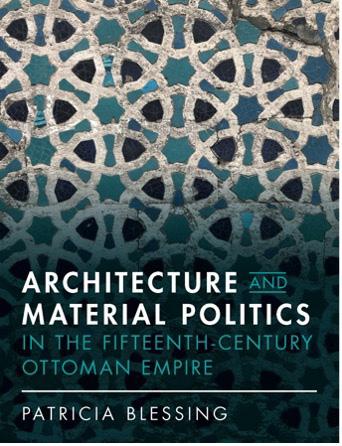
Blessing, Patricia. Architecture and Material Politics in the Fifteenth-century Ottoman Empire. Cambridge: Cambridge University Press, 2022.
Barakat, Nora. Review of Talha Çiçek, Negotiating Empire in the Middle East: Ottomans and Arab Nomads in the Modern Era, 1840-1914 (Cambridge: Cambridge University Press, 2020). International Journal of Middle East Studies 55:1 (2023): 199-201.
Blaydes, Lisa. “Assessing the Labor Conditions of Migrant Domestic Workers in the Arab Gulf States.” ILR Review 76 (August 2023): 724-747.

Ekici, Didem, Basile Baudez, and Patricia Blessing, eds. Textile in Architecture: From the Middle Ages to Modernity. New York: Routledge, 2023.
19
FACULTY PUBLICATIONS
Errazzouki, Samia. “Between the ‘Yellow-Skinned Enemy’ and the ‘Black-Skinned Slave’: Early Modern Genealogies of Race and Slavery in Sa`dian Morocco.” The Journal of North African Studies 28, no. 2 (2023): 258-268. DOI: 10.1080/13629387.2021.1927557.
Errazzouki, Samia. “Partners in Empire: Sultan Ahmad al-Mansur and Queen Elizabeth I.” The Journal of North African Studies 28, no. 3 (2023): 501-518. DOI: 10.1080/13629387.2021.1973242.
Errazzouki, Samia. “The People vs. the Palace.” In Struggles for Political Change in the Arab World: Regimes, Oppositions, and External Actors after the Spring, edited by Lisa Blaydes, Amr Hamzawy, and Hesham Sallam, 2022.
Ghereghlou, Kioumars. “A Forgotten Money Heist: The 1746 Mission of Nadir Shah’s Chief Merchant in Russia Revisited.” Iran 61, no. 1 (2023): 130-147. DOI: 10.1080/05786967.2020.1829983.
Glasberg, Rebecca. “Déjà lu?: On Rachid Boudjedra’s Recurring Jewish-Muslim Figure.” L’Esprit Créateur 63, no. 3 (2023): 80-93. Project MUSE. https://doi. org/10.1353/esp.2023.a906704
Hamed-Troyansky, Vladimir. “Population Transfer: Negotiating the Resettlement of Chechen Refugees in the Ottoman Empire (1865, 1870).” In Russian-Arab Worlds: A Documentary History, edited by Eileen Kane, Masha Kirasirova, and Margaret Litvin. Oxford University Press, 2023, 60–68.
Hamed-Troyansky, Vladimir. “Welcome, Not Welcome: The North Caucasian Diaspora’s Attempted Return to Russia since the 1960s.” Kritika: Explorations in Russian and Eurasian History 24, no. 3 (2023): 585–610.
Kelman, Ari Y., Ilana M. Horwitz, and Abiya Ahmed. “The Other Dual Curriculum: Jewish Community High School Students’ Reflections on What Counts as ‘Jewish’ Learning.” Journal of Jewish Education 89, no. 4 (2023): 398-417. DOI:10.1080/15244113.2023.2258236.
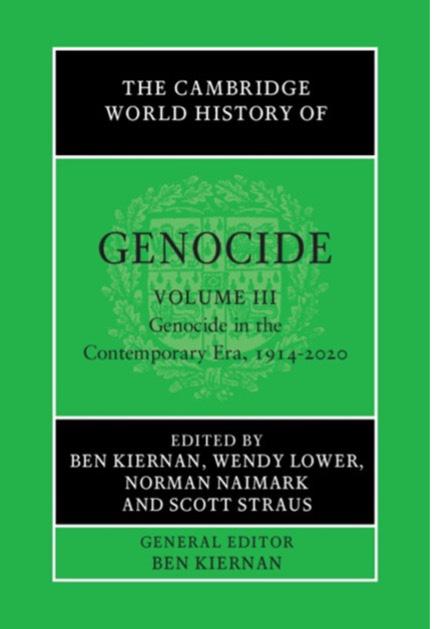
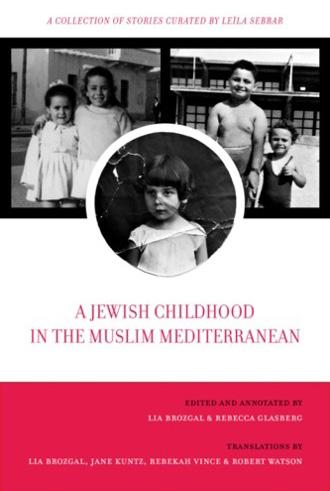
Kiernan, Ben, Wendy Lower, Norman M. Naimark, and Scott Straus, eds. The Cambridge World History of Genocide. Volume III, Genocide in the Contemporary Era, 1914-2020. 1st ed. Cambridge: Cambridge University Press, 2023.
Kuntz, Jane, Rebekah Vince, and Robert Watson. A Jewish Childhood in the Muslim Mediterranean: A Collection of Stories. Curated by Leïla Sebbar, edited by Lia Brozgal and Rebecca Glasberg. 1st ed., vol. 2. Oakland: University of California Press, 2023. https:// doi.org/10.2307/jj.1791903.
McLennan, Scotty. “Book Talk: Work Pray Code: When Work Becomes Religion in Silicon Valley.” Review of Work Pray Code: When Work Becomes Religion in Silicon Valley, by Carolyn Chen. Interdisciplinary Journal of Research on Religion 18 (2022): 1-8.
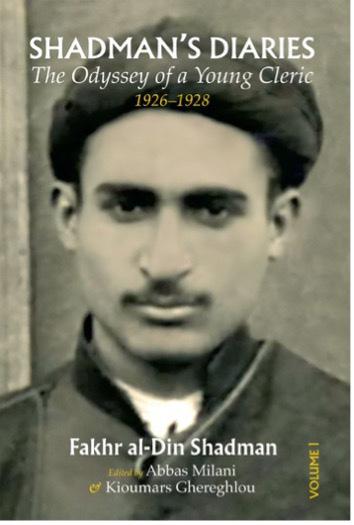
Milani, Abbas, and Kioumars Ghereghlou, eds. Shadman’s Diaries: Odyssey of a Young Cleric, 1926-1928. Washington, DC: Mage Publishers, 2023.
20
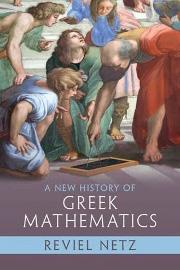

Netz, Reviel. A New History of Greek Mathematics. Cambridge: Cambridge University Press, 2022.
Sallam, Hesham. Classless Politics: Islamist Movements, the Left, and Authoritarian Legacies in Egypt. New York: Columbia University Press, 2022.
Sallam, Hesham. “The Autocrat-in-Training: The Sisi Regime at 10.” Journal of Democracy 35, no. 1 (2024): 87-101. https://doi.org/10.1353/jod.2024.a915351.
Satia, Priya. Review of Jairus Banaji, A Brief History of Commercial Capitalism, Storica 83-84 (2023): 227-241.
Song, David Shuang, Abiya Ahmed, Tamara Gilkes Borr, and Anthony Lising Antonio. “Multiracials’ Membership and Identification Practices on Campus: A Boundary-Work Approach.” Race Ethnicity and Education (2022): 1-21. DOI: 10.1080/13613324.2022.2114510.
Sallam, Hesham. “‘Only Me’: Repression, Legal Engineering, and State-Managed Elections in Sisi’s Egypt.” In Routledge Handbook on Elections in the Middle East and North Africa , edited by Francesco Cavatorta and Valeria Resta. Oxon: Routledge, 2023.

Sallam, Hesham. Struggles for Political Change in the Arab World: Regimes, Oppositions, and External Actors after the Spring, edited with Lisa Blaydes and Amr Hamzawy. Ann Arbor: University of Michigan Press, 2022.
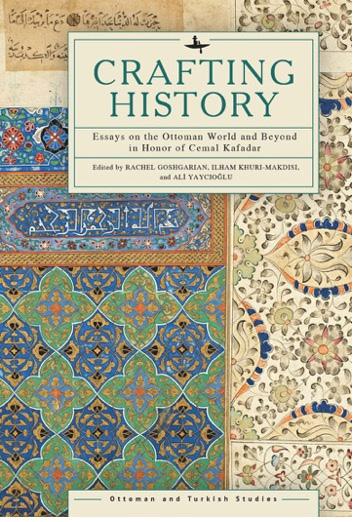
Yaycıoğlu, Ali, Ilham KhuriMakdisi, and Rachel Goshgarian, eds. Crafting History: Essays on the Ottoman World and Beyond in Honor of Cemal Kafadar. Brookline, MA: Academic Studies Press, 2023.
Yaycıoğlu, Ali. “Ottoman Montology: Hazardous Resourcefulness and Uneasy Symbiosis in a Mountain Empire.” In Crafting History: Essays on the Ottoman World and Beyond in Honor of Cemal Kafadar, edited by Ali Yaycioglu, Ilham Khuri-Makdisi, and Rachel Goshgarian, 345-374. Brookline, MA: Academic Studies Press, 2023.
Yolaçan, Serkan. “Time as Method.” Journal of the Economic and Social History of the Orient 66 (2023): 983-987. https://brill.com/view/journals/jesh/66/7/ article-p983_6.xml.
21
GIFTS & SUPPORT
We at the Abbasi Program express our gratitude to our alumni, parents, students, and friends for their support of our activities at Stanford.
Your gift enhances genuine understanding of the histories, cultures, and languages of Islam and Islamicate societies by:
• Equipping the next generation of leaders with rigorous knowledge through courses, seminars, and research or internship opportunities.
• Supporting innovative faculty research and scholarship.
• Deepening our public and K-12 outreach efforts.
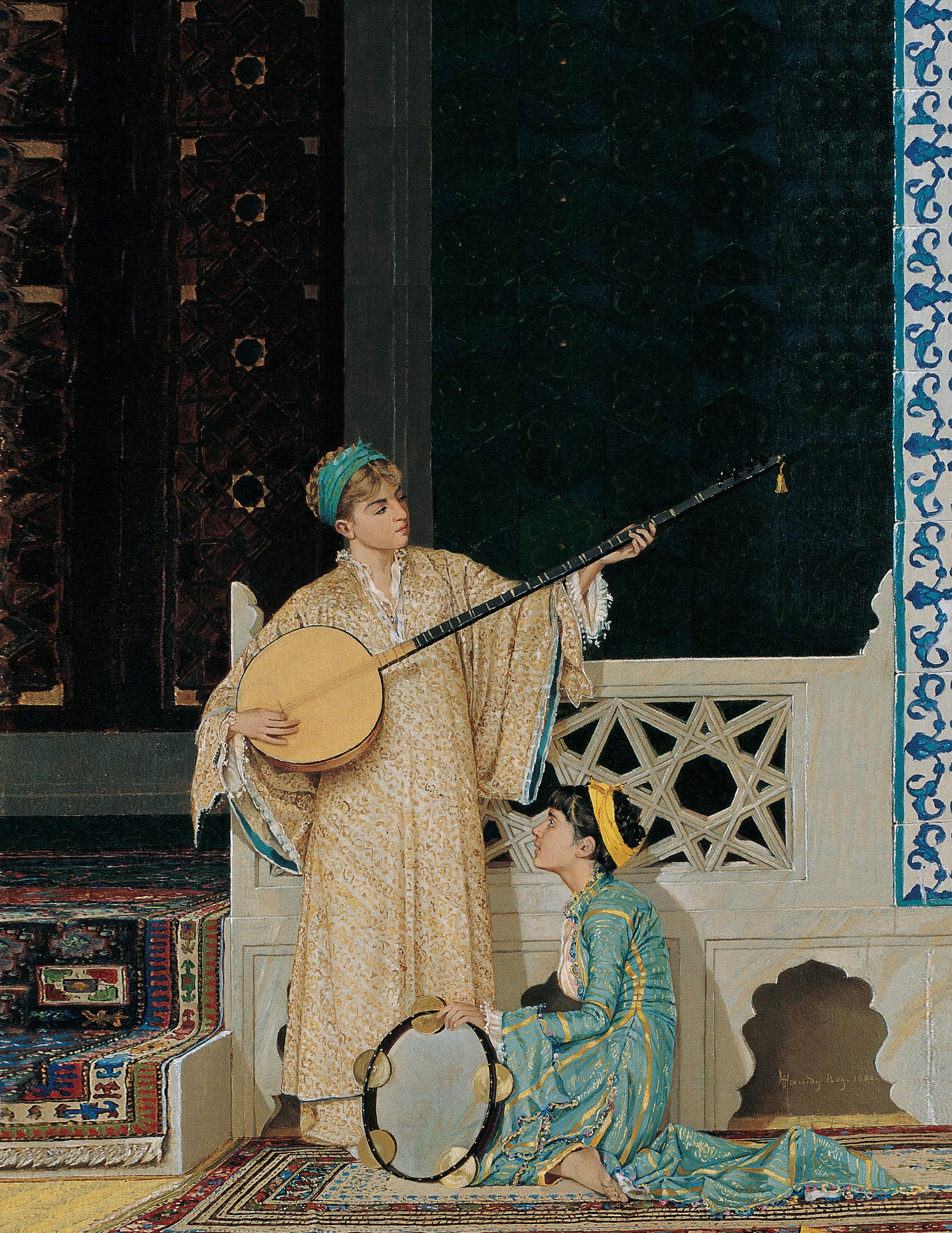
Your generosity ensures that knowledge of Islam and Islamicate societies is an integral part of the future of America and the globe.
For more information, please review islamicstudies.stanford.edu/about/ make-gift or contact Scott Sugiura, Senior Associate Director of Development, at (650) 723-1208 or ssugiura@stanford.edu.
22
23
islamicstudies.stanford.edu Abbasi Program in Islamic Studies Stanford Global Studies Division 615 Crothers Way, Encina Commons, Suite 124 Stanford, CA 94305-6006, USA








































































